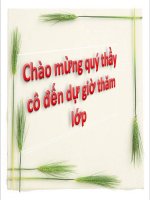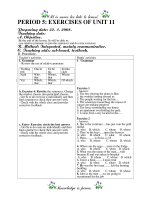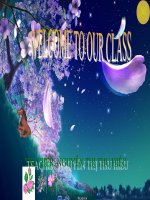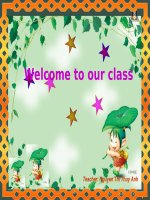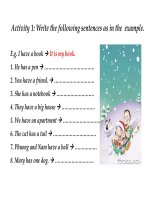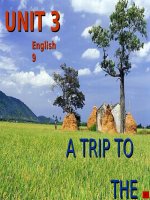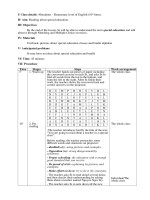Unit 3 Exercise
Bạn đang xem bản rút gọn của tài liệu. Xem và tải ngay bản đầy đủ của tài liệu tại đây (201.04 KB, 12 trang )
UNIT 3: WAYS OF SOCILISING
PRACTICE TEST 3
A. PHONETICS
I. Choose the word whose underlined part is pronounced differently from that of the
others.
1. A. hear B. clear C. bear D. ear
2. A. thick B. this C. think D. thin
3. A. attract B. clap C. wave D. hand
4. A. discuss B. jump C. argument D. public
5. A. signal B. slightly C. polite D. excite
II. Choose the word whose main stressed syllable is different from that of the others.
6. A. approach B. social C. discuss D. consider
7. A. impolite B. informality C. appropriate D. situation
8. A. compliment B. terrible C. perfectly D. attract
9. A. assistance B. marvellous C. argument D. fashionable
10. A. signal B. install C. decent D. verbal
B. VOCABULARY AND STRUCTURES
Choose the best answer among A, B, C or D to complete each sentence.
11. We can ................... not only through words but also through body language.
A. talk B. transfer C. interpret D. communicate
12. ….......... and interest are two major factors that make you succeed in your work.
A. Friendliness B. Friendly C. Friendship D. Unfriendly
13. It OK to use …….…........ language if you’re speaking to a friend.
A. verbal B. non-verbal C. formal D. informal
14. Although I spoke to him many times, he never paid any ............... to what I said.
A. notice B. care C. mind D. attention
15. After listening to all the .......................... I am now of the opinion that there
should be no new road.
A. attitudes B. regulations C. compliments D. arguments
16. Some people think it is ........................ to ask someone’s age.
A. rude B. impolite C. disrespectful D. discourteous
17. It is very ...................... – more of a chat than an interview.
A. formal B. informal C. formality D. informality
18. Gestures such as waving and handshaking are ............ forms of communication.
A. direct B. regular C. verbal D. non-verbal
19. I make no ..........……… for encouraging my children to succeed in school.
A. apologize B. apologetic C. apologies D. apologetically
20. It’s ….............. knowledge that smoking and cancer are linked.
A. normal B. common C. wide D. complete
21.
Mr
Brown
said,
“I
watched
TV
last
night.”
-->
Mr
Brown
said
that
he
……………………..
TV
the
night
before.
A.
was
watching B.
watched C.
had
watched D.
has
watched
22.
Bob
said,
“We
had
a
wonderful
time
at
Peter’s
party.”
--->
Bob
said
………………………
a
wonderful
time
at
Peter’s
party.
A.
he
had B.
they
had
had C.
we
had D.
we
had
had
23.
Peter
reported,
“We
played
a
lot
of
tennis
last
year.”
--->
Peter
reported
that
they
had
played
a
lot
of
tennis
……………………….
.
A.
the
following year B.
the
year
before C.
last
year
D.
A&B
are
correct
24.
The
Clarks
told
us,
“We
drove
right
down
to
Athens
last
summer.”
--->
The
Clarks
told
us
……………….
right
down
to
Athens
……………….
.
A.
he
had
driven
/
the
summer
before B.
they
had
driven
/
the
summer
before
C.
they
drove
/
the
previous
summer D.
he
drove
/
last
summer
25.
Mrs
Miller
said,
“I
don’t
feel
better
now.”
--->
Mrs
Miller
said
she
…………
feel
better
……………….
.
A.
they
not
/
now B.
she
doesn’t
/
then
C.
she
didn’t
/
thenD.
they
didn’t
/
now
26.
Phil
asked
me,
“Were
you
at
the
party?”
--->
Phil
asked
me
………………………..
at
the
party.
A.
had
I
been B.
if
I
had
been C.
whether
I
was
D.
B&C
are
correct
27.
Ann
asked
Kirk,
“Did
you
really
write
this
story?”
--->
Ann
asked
Kirk
…………………..
really
………………….
story.
A.
whether
he
had
/
written
that B.
if
he
wrote
/
that
C.
to
write
/
this D.
he
had
written
/
this
28.
The
mother
asked
him,
“Why
are
your
clothes
so
dirty?”
--->
The
mother
asked
him
why
………………………..
so
dirty.
A.
were
his
clothesB.
my
clothes
are
C.
clothes
were D.
his
clothes
were
29.
He
wanted
to
know,
“Which
picture
is
the
most
famous
one?”
--->
He
wanted
to
know
……………………
the
most
famous
one.
A.
which
picture
was B.
whether
it
was
C.
which
is D.
that
picture
was
30.
He
told
her,
“Don't
call
me
before
7
o'clock!
--->
He
told
her
………………….
before
7
o’clock.
A.
not
to
call
me B.
not
to
call
him
C.
to
call
him D.
to
call
me
C. READING COMPREHENSION
I. Read the passage carefully and then choose the best answer.
During the teenager years, many young people can at times be difficult to talk
to. They often seem to dislike being questioned. They may seem unwilling to talk
about their work in school. This is normal development at this age, though it can be
very hard for parents to understand. It is part of becoming independent of teenagers
trying to be adult while they are still growing up. Young people are usually more
willing to talk if they believe that questions are asked out of real interest and not
because people are trying to check up on them.
Parents should do their best to talk to their sons or daughters about school
work and future plant but should not push them to talk if they don’t want to. Parents
should also watch for the danger signs: some young people in trying to be adult may
experiment with sex, drugs, alcohol or smoking.
Parents need to watch for any signs of unusual behaviour which may be
connected these and get help if necessary.
31. This passage is taken from a________________.
A. handbook for parents C. school timetable
B. teenage magazine D. book for children
32. Why do adults sometimes find teenagers difficult to talk to?
A. because teenagers don’t want to talk to other people.
B. because most teenagers are quiet.
C. because teenagers think adults are not honest.
D. because most teenagers hate adults.
33. When can you expect young people to be more talkative than usual?
A. When people talk to them because they are really interested and not just checking
on them.
B. When adult give them a lot of money to spend.
C. When adults talk to them about something other than their work in school.
D. When adult talk to them about sex, alcohol and drugs.
34. Some teenagers experiment with drinking and smoking because___________.
A. cigarettes and alcohol are available everywhere.
B. cigarettes and alcohol are cheap.
C. women like smoking and drinking men.
D. They regard them as a mark of adulthood.
35. The word BEHAVIOUR in the passage most nearly means ____________.
A. feeling B. manners C. activities D. reaction
II. Read the passage and choose the part (A, B, C or D) that best fits each numbered
blank.
It is important in the US to have a handshake that is firm.
This is (36) ………… important in business. A handshake should not be (37)
………… strong that it hurts the other person, but it should be firm (38) ………… .
Many Americans believe that a weak handshake (39) ………… that the person also
has a weak character and is not honest. This is true (40) ………… two men, two
women, or a man and a woman.
36. A. especial B. especially C. particular D. most
37. A. such B. as C. so D. very
38. A. enough B. too C. much D. very
39. A. tells B. means C. requires D. demands
40. A. to B. from C. with D. for
IV. WRITING
I. Choose the underlined word or phrase that needs correcting.
41. He asked them what time did the plane arrive.
A B C D
42. Did you say that you will have a lot of things to do the following week?
A B C D
43. He told me that he had sent the gift yesterday.
A B C D
44. I asked to him whose car he had borrowed the night before.
A B C D
45. Tom said that he had seen John the day before but John didn’t see him.
A B C D
II. Rewrite the following sentences without changing their original meanings.
46. Nam said, "I won't stay at home next week."
A. Nam said he wouldn't stay at home the following week.
B. Nam said he wouldn't stay at home following week.
C. Nam said I wouldn't stay at home the following week.
D. Nam said I wouldn't stay at home following week.
47. He said, “I bought these books last week.”
A. He said he had bought these books last week.
C. He said he had bought those books the week before.
B. He said he bought those books last week.
D. He said he bought these books the week before.
48. The doctor said to me, “You may have to stay in bed for a week.”
A. The doctor said to me I may have to stay in bed for a week.
B. The doctor told me I might have to stay in bed for a week.
C. The doctor said me I may have to stay in bed for a week.
D. The doctor told to me I might have to stay in bed for a week.
49. The mother said:" Have you studied your lesson, Nam?"
A. The mother asked Nam that he had studied his lesson.
B. The mother asked Nam if he had studied his lesson.
C. The mother asked Nam he had studied his lesson.
D. The mother asked Nam have he studied his lesson.
50. The mother asked her son, "Why don't you do the exercises?"
A. The mother asked her son why he had not do the exercises.
B. The mother asked her son why he did not do the exercises.
C. The mother asked her son why he has not do the exercises.
D. The mother asked her son why didn't he do the exercises.
Gởi đến cô Ngô Bảo Thoa:
Bà già đi chọc Bạch Kim
Bói xem một quẻ im mồm được chăng?
Thầy bói gieo quẻ nói rằng:
Im sao mà được, nói năng ngược đời.
Xin các bạn xem tổng hợp ý kiến và cho nhận xét:
Bạn Bình có thấy cuối trang có Tên của Tôi (Bảo Thoa)? Phải KÍN KẼ chứ!
Ngô Đình Bảo Thoa @ 16:59 15/09/08
Do Cô Ngô Đình Bảo Thoa nỗi tiếng quá..........
Trịnh Thị Kim Loan @ 17:03 15/09/08
NỔI TIẾNG chứ! (dấu ngã là NỖI LÒNG). Tôi chỉ nhắc TTBình cẩn thận hơn 1 tí
(chùi mép cho khéo) kẻo không diễn đàn Bạch Kim sẽ "bịt mũi" cười cho đấy! Cảm
ơn Trịnh Thị Kim Loan có nhắc đến tên Tôi. Chứng tỏ Bảo Thoa không đến NỖI là
không có gì đáng nhớ!
Ngô Đình Bảo Thoa @ 17:32 15/09/08
Phải nói cô Ngô Đình Bảo Thoa Giỏi quá. Đã phát hiện bản “copy của mình”.
‡♥‡Nguyễn Duy‡♥‡ @ 17:37 15/09/08
1. Quý Thầy Cô chịu khó kéo Scroll Bar cho "Tài Liệu" của TTB đến cuối trang sẽ
thấy hai chữ "Bảo Thoa" trước số trang. 2. Ngô Đình Bảo Thoa và Vô Danh Khách
là HAI người hoàn toàn khác nhau. 3. Có lẽ TTB rảnh rỗi quá nên muốn "nêu vấn
đề" để kéo sự chú ý của diễn đàn chăng? 4. Ai là "THÙNG RỖNG KÊU TO" diễn
đàn BK đã và sẽ thấy rõ rồi!
Ngô Đình Bảo Thoa @ 11:08 16/09/08
Nếu bài này Bảo Thoa đã đưa lên thư viện rồi thì BQT sẽ không duyệt nữa! Ý Bảo
Thoa thế nào?
Nguyễn Lương Hùng @ 12:23 16/09/08
Kính gửi Thầy Nguyễn Lương Hùng,
Không sao cả, Thầy ạ! Tôi nêu ý kiến là để góp ý cho TTB thôi! Theo tôi, ai dùng tư
liệu của tôi cũng được, nhưng với một điều kiện: phát hiện được lỗi sai trong tư liệu
của tôi, có chỉnh sửa và vẫn để nguyên tên tác "giả" đầu tiên khi đưa lên lại Bạch
Kim. Có như vậy, không những tôi mà quý đồng nghiệp khác lại biết ơn thêm nữa!
Thật ra, trong mỗi tư liệu mỗi người đưa lên đều có dấu tích riêng mà chỉ có người đó
biết thôi. Nếu "bê nguyên si" rồi đưa lên lại là "lộ" ra ngay! Nói chung, chuyện nầy là
chuyện "bé" thôi. Xin Thầy đừng bận tâm. Cảm ơn Thầy quan tâm. Chúc Thầy vui,
khỏe.
Ngô Đình Bảo Thoa @ 12:40 16/09/08
Các bạn trên diễn đàn BK thân mến! Cô Ngô Đình Bảo Thoa thực sự là Ngô Bảo
Thoa (từng có nick là Ngoa Bao Thổ, tại sao 1 giáo viên lại phải thay đổi tên mình
thế?!) đã từng làm náo động diễn đàn những này qua. Cô Thoa đã đưa ra những lời lẽ
rất khiếm nhã đến nổi các thành viên BK yêu cầu cô phải xin lỗi trước diễn đàn.
Tôi xin trích lại ý kiến cô trong những này qua: Cô luôn nói rằng :”…….. đã post bài
lên BK thì không còn là của riêng nữa…….., mọi người có thể down và chỉnh sửa

